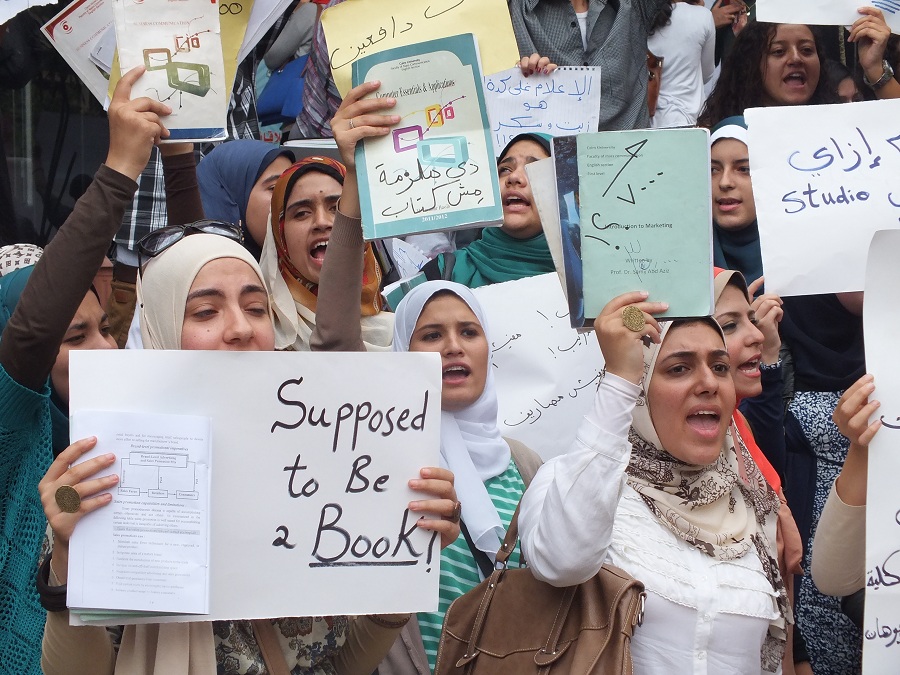Training is a must for the development of small- and medium-sized enterprises (SME) in Egypt, the executive manager of the Egyptian Banking Institute Mona El-Baradei said.
El-Baradei told Daily News Egypt that the institute is exerting intensive efforts in training bank employees and the owners of these projects, as well as raising awareness on the importance of SMEs.
According to the executive manager, SMEs are considered the engine for sustainable development, as well as an effective treatment for the problem of unemployment. They also contribute to increasing the gross domestic product (GDP), and raising the living standards of citizens.
Project owners’ poor marketing abilities and management skills as well as the prevalence of administrative obstacles are considered the main challenges for this type of project in Egypt, she said.
Banks must provide a variety of banking services to serve these projects and develop mechanisms to evaluate the creditworthiness and risks of the projects.
What efforts is the Egyptian Banking Institute making in order to help SMEs?
The institute has carried out several procedures to serve these projects and is still playing a major role in this regard.
Among these procedures is launching a specialised electronic gate through which the data base of these projects is available. A cooperation agreement was also signed with the British Council and the TYRO training institution in order to spread the concept of entrepreneurship.
The institute is also holding awareness seminars at Egyptian universities in the field of financial education and the systems of entrepreneurships and SMEs, in cooperation with the Egyptian banking sector.
The institute is also working to encourage the banking sector to finance using the franchise system as a mechanism to support SMEs, in cooperation with the Social Fund for Development (SFD) and the African Development Bank (AFDB).
A study tour for a group of bankers and representatives from the Social Fund for Development in South Africa was organised by the institute in order to review the success stories and the best international practices in financing entities using the franchise system.
Several field visits were also organised to countries like India, Turkey, Italy, Kenya, Canada, Germany, and Malaysia in order to become acquainted with the application of the best international practices in the field of SMEs.
Moreover, the institute organises discussion seminars between commercial chambers and banks in Egypt with the goal of introducing them to the common problems and obstacles of financing different economic sectors.
What is the importance of SMEs for the Egyptian economy?
SMEs are a locomotive for sustainable development and an effective treatment for unemployment, along with its effective contribution to increasing the gross domestic production, and raising living standards.
According to statistics from 2013, these projects represent about 99% of the total number of projects that operate in the non-agricultural private sector in Egypt. They also contribute to the gross domestic product by 47%.
Moreover, those projects contribute to the employment of about 75% of the workforce in Egypt, save agricultural projects.
What are the challenges facing these projects?
These projects face a number of challenges, most notably, the low efficiency of feasibility studies, the lack of sufficient guarantees requested by financing institutions, and the high cost of loans.
Those projects also face challenges related to weak marketing capacity, lack of specialised products, weak management skills of their owners, and the administrative obstacles to obtaining the necessary funding.
What do they need for development?
It is necessary to support cooperation between the new training centres for these projects. An alternative is renewing existing centres and providing them with the appropriate technologies, and expanding with the establishment of business incubators.
It is necessary to activate the small business centres and provide them with entrepreneurial education.
The state should also encourage the franchise system and support service projects, particularly those for representing women. In addition, establishing companies specialised in marketing the products of these companies, as well as clustering, will also contribute to the development of SMEs.
It is also important to work on the integration of informal facilities into the formal sector, attending to creativity, innovation, and the development of education and training. Moreover, efforts to raise awareness and strengthen the culture of entrepreneurship should be condensed, in cooperation with the institution to utilise its experiences, advisers, and trainers.
Next to all these factors, we should also work on encouraging entrepreneurship and diversify financial mechanisms, as well as taking policies and measures conducive to development, develop the funding of the banking system, and raise the administrative efficiency of SMEs owners. Here, I like to refer to the importance of venture capital institutions, which are a means for financial, technical, and administrative support to emerging projects.
It also wants to emphasise the importance of the role of banks in providing different types of banking products to serve these projects, and the development of assessing creditworthiness and risk commensurate with the nature of the activities and the owners of these projects mechanisms [credit scoring].
It is also important that the specialised companies provide various consulting services to customers, and for banks to provide its customers with different types of funding, whether long-term or short-term, through a variety of credit facilities available to its customers.
What about the role of non-bank financing institutions in the service of these projects?
This sector includes many types of financing institutions that provide funding in the form of participation in the capital or loans for SMEs, including factoring companies, financial leasing companies, securities, and direct investment funds.
What is the importance of the franchise system for these projects?
The franchise system is one of the supporting mechanisms for SMEs. It contributes to reducing the risk element in many forms and offers the latest marketing and management systems.
It also contributes to the development of the national labour force through training.
What about the role of Islamic financing?
There are many funding formulas used in Islamic banking that adhere to Sharia law.
They include formulas to finance through Ijara with promise of ownership, financing through Murabaha, financing through the sale of Istisna’a, and funding through the sales commission, along with funding to participate.
Which are the most prominent supporting bodies for SMEs in Egypt?
The Social Fund for Development, which offers technical and financial support for small and micro projects.
There is also the Egyptian Financial Supervisory Authority, which is preparing to issue a special projects law for micro-enterprises. There are multilateral development funds and projects financed from foreign aid agencies. Moreover, there are the Ministry of Industry and Trade and the Industrial Modernisation Centre.
What about the role of the banking sector?
The banking system under the umbrella of the Central Bank of Egypt (CBE) offers a range of initiatives that contribute to the development of this sector.
The most important of these initiatives is exempting banks that provide funding for these projects from the compulsory cash reserve ratio of 10%. The CBE also established a portal for data of about 36,000 projects in cooperation with the institution.
Banks also founded I Score – Egyptian Credit Bureau, which has a great role in providing historical data on clients of this sector and providing an assessment of the level of the merits of these customers.
Many banks in the market, if not all of them, have designated departments for funding these projects.




